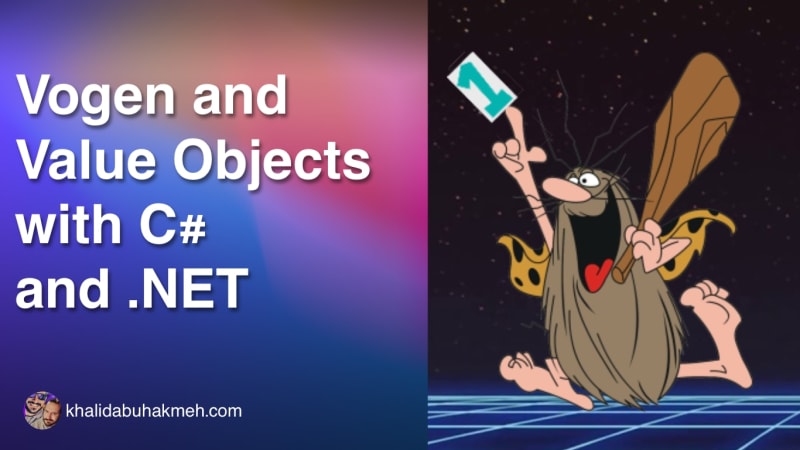Using Vogen for Value Objects in C# and .NET
In this post, Khalid Abuhakmeh demonstrates how value objects and the Vogen library can enhance code correctness and readability in C# and .NET. The article is packed with practical code examples and advice for applying value object patterns.
Vogen and Value Objects with C# and .NET
By Khalid Abuhakmeh

Photo by Captain Caveman
Introduction
Programming is not just about writing code that works—it’s about ensuring that the code behaves correctly under all circumstances. To prevent logic errors and unexpected behavior, developers frequently try to constrain and model potential outliers in their code. One way to achieve this in .NET is by leveraging value objects, a tactic that can add both clarity and safety, especially with the help of tools like the Vogen library.
This post explores how value objects work, their benefits, and how Vogen can help automate and enforce these patterns in your codebase.
What is a Value Object?
A value object is a simple, immutable object that represents a specific domain concept using a .NET primitive value such as int, bool, or string. For example, consider representing a person’s birth date:
DateTime birthDate = new DateTime(1990, 1, 1);
On its own, this code doesn’t prevent confusion between, for example, a birth date and a movie release date. Both are stored as DateTime values and could be incorrectly interchanged:
DateTime birthDate = new DateTime(1990, 1, 1);
SetMovieReleaseDate(birthDate);
void SetMovieReleaseDate(DateTime date) { /* ... */ }
This lack of specificity can introduce logical bugs. To clarify intent, you can define distinct value objects:
var birthDate = new BirthDateTime(new DateTime(1990, 1, 1));
var movieReleaseDate = new MovieReleaseDateTime(birthDate.Value);
SetMovieReleaseDate(movieReleaseDate);
void SetMovieReleaseDate(MovieReleaseDateTime date) { /* ... */ }
// value objects
public record MovieReleaseDateTime(DateTime Value);
public record BirthDateTime(DateTime Value);
Now, the code enforces logical separation between different uses of DateTime. While such an approach may appear verbose, it enhances clarity and reduces logical errors.
What is Vogen?
Vogen is a NuGet library for .NET that uses source generators to automate the creation of value objects. Vogen reduces boilerplate around value objects by generating factory methods, equality checks, validation routines, and serializer support for partial struct and class definitions.
Getting Started
Add Vogen to a .NET project via NuGet:
<PackageReference Include="Vogen" Version="7.0.0-beta.1" />
Example: Modeling Pac-Man’s Favorite Ghost
Suppose you want a PacMan class with a property FavoriteGhost of type Ghost (which should only allow known Pac-Man ghosts).
Unconstrained approach using Vogen:
[ValueObject<string>]
[Instance("Blinky", "Blinky")]
[Instance("Pinky", "Pinky")]
[Instance("Inky", "Inky")]
[Instance("Clyde", "Clyde")]
public partial struct Ghost;
The generated code allows usage like:
var pacMan = new PacMan { FavoriteGhost = Ghost.Blinky };
var aNewGhost = Ghost.From("Khalid"); // Valid, but not desired
Constraining Possible Values
To tightly constrain the Ghost value object so only specific names are allowed:
[ValueObject<string>]
public partial struct Ghost
{
public static readonly Ghost Blinky = new("Blinky");
public static readonly Ghost Pinky = new("Pinky");
public static readonly Ghost Inky = new("Inky");
public static readonly Ghost Clyde = new("Clyde");
public static IReadOnlyCollection<Ghost> All { get; } = new[] { Blinky, Pinky, Inky, Clyde }.AsReadOnly();
private static Validation Validate(string input) =>
All.Any(g => g.Equals(input))
? Validation.Ok
: Validation.Invalid($"Ghost must be {string.Join(", ", All)}");
}
This setup provides:
- A limited, explicit set of valid values
- Compile-time and runtime validation
- Cleaner, safer modeling of domain logic
Usage examples:
// Throws an exception (invalid ghost name)
var aNewGhost = Ghost.From("Khalid");
// Passes validation
var aKnownGhost = Ghost.From("Blinky");
Complete Sample
Putting it all together:
using Vogen;
var pacMan = new PacMan { FavoriteGhost = Ghost.Blinky };
foreach (var ghost in Ghost.All)
{
Console.WriteLine(ghost);
}
Console.WriteLine(pacMan);
[ValueObject<string>]
public partial struct Ghost
{
public static readonly Ghost Blinky = new("Blinky");
public static readonly Ghost Pinky = new("Pinky");
public static readonly Ghost Inky = new("Inky");
public static readonly Ghost Clyde = new("Clyde");
public static IReadOnlyCollection<Ghost> All { get; } = new[] { Blinky, Pinky, Inky, Clyde }.AsReadOnly();
private static Validation Validate(string input) =>
All.Any(g => g.Equals(input))
? Validation.Ok
: Validation.Invalid($"Ghost must be {string.Join(", ", All)}");
}
public class PacMan
{
public Ghost FavoriteGhost { get; set; }
public override string ToString() => $"Pac Man's favorite ghost is {FavoriteGhost}.";
}
Conclusion
Value objects in .NET provide logical constraints and improve code readability. With Vogen, you can automate much of the boilerplate, reducing developer errors while supporting explicit domain modeling. Consider experimenting by converting some of your existing code to use value objects and see if it helps with both correctness and maintainability.
About Khalid Abuhakmeh
Khalid is a developer advocate at JetBrains with a focus on .NET technologies and tooling.
Further Reading
This post appeared first on “Khalid Abuhakmeh’s Blog”. Read the entire article here